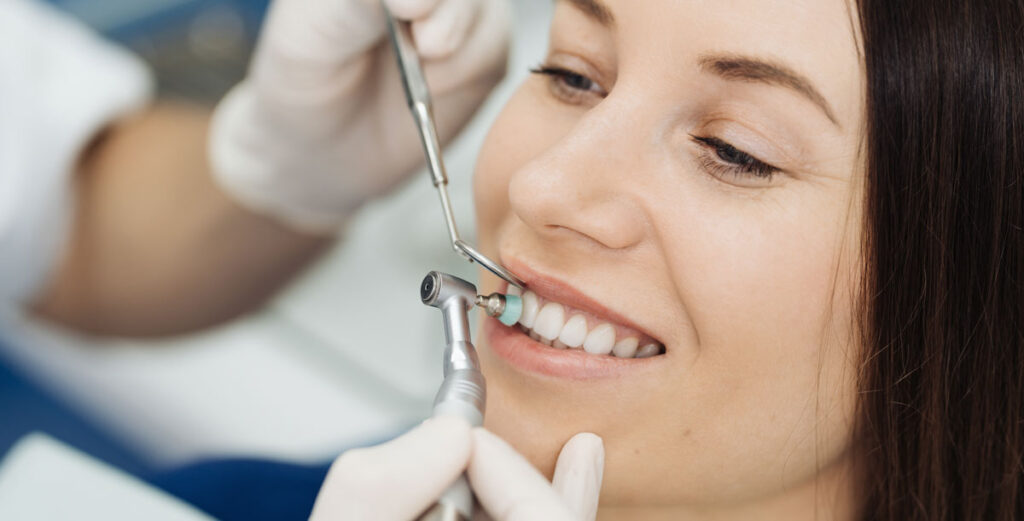Veneers are one of the most popular dental treatments in modern cosmetic dentistry, offering a non-invasive yet effective solution to a range of cosmetic dental concerns.
Whether you’re dealing with chipped, discoloured, uneven, or any other sort of damaged teeth, dental veneers offer a way to transform your smile and boost your confidence.
In this comprehensive guide, we’ll take you through everything you need to know about veneers, from the types and procedure to the benefits and aftercare.
What are veneers?
Dental veneers are thin, custom-made shells that are placed over the front surface of your teeth to improve their appearance.
Typically made from porcelain or composite resin, these shells are designed to cover imperfections like stains, chips, cracks, or misshapen or uneven teeth. Veneers not only enhance the aesthetics of your teeth but can also help restore the structural integrity of a tooth that may be damaged.

Why are veneers popular?
Veneers have become increasingly popular because they can be used to improve a whole host of cosmetic dental problems with minimal invasiveness.
One of the main reasons for their popularity is that, because veneers cover the entire tooth, they provide a quick and effective solution to imperfections that would otherwise require more complex dental procedures. Here are a few key reasons why veneers are so widely sought after:
Minimal tooth preparation
Unlike dental crowns or orthodontic treatments, traditional veneers require minimal alteration to the natural tooth structure. Only a thin layer of enamel is removed to ensure a proper fit, making veneers a less invasive alternative for improving your smile.
Natural appearance
Dental veneers, particularly porcelain veneers, are known for their ability to mimic the natural tooth colour and appearance. The material’s translucency and ability to reflect light in a similar way to enamel give veneers a realistic, lifelike look.
Long-lasting results
With proper care, veneers can last for many years (typically between 10 to 15 years for porcelain veneers). This longevity makes them a worthwhile investment for those seeking a durable and lasting cosmetic solution.
Stain resistance
Porcelain veneers are resistant to stains from common substances like coffee, tea, and red wine, helping to maintain a bright and white smile over time.
Versatility
Veneers are a solution for a wide range of issues people might have with the appearance of their teeth. This versatility makes them an appealing option for individuals looking to correct issues like discolouration, chipped teeth, gaps, or minor misalignments.
For many people, veneers offer a combination of quick, visible results with minimal disruption to their everyday lives, making them a go-to option for a smile makeover.
Types of veneers
There are various types of veneers to choose from, each with their own benefits. Understanding the differences between them will help you make an informed decision when choosing the best type of veneer for your needs.
Porcelain veneers
With their natural appearance, durability, and resistance to stains, porcelain veneers are the most popular option.
Made in a dental lab by a dental technician, these custom veneers are crafted to fit the unique shape of your teeth to a smile design specification. They mimic certain elements natural teeth that are otherwise difficult to achieve, such as translucency, and are highly resistant to discolouration. This makes them a long-lasting option for individuals who want the most perfect smile possible.
Porcelain veneers are ideal for addressing concerns like stained, chipped, or broken teeth and can last anywhere from 10 to 15 years with proper care.

Composite veneers
Composite veneers are made from a resin material that is applied directly to the surface of your teeth by a cosmetic dentist.
This type of veneer is less expensive than porcelain and can be applied in a single visit. Although composite veneers may not be as durable or stain-resistant as porcelain, they are still a great option for those seeking a quicker and more affordable option for cosmetic dental treatment.
Composite veneers are also more easily repairable in case of chips or cracks, making them a good choice for those on a budget.
Lumineers
Lumineers are a type of no-prep veneer that requires little to no tooth preparation before placement. These ultra-thin veneers are designed to cover imperfections while preserving the natural tooth structure.
Because Lumineers are so thin, they are often a more conservative option than traditional porcelain veneers. They’re ideal for patients with minor cosmetic concerns and can provide a subtle enhancement to your smile without significant changes to the natural tooth structure.
Is getting veneers right for you?
Veneers are not suitable for everyone. While they offer significant cosmetic improvements, it’s important to consider your oral health and the specific dental issues you’re looking to address.
Suitable candidates for veneers
Candidates for veneers should have healthy teeth and gums so they are able to provide a strong foundation for the treatment. It’s important that individuals are committed to maintaining excellent oral hygiene, as veneers require proper care to ensure their longevity and appearance.
People should also go into treatment with realistic expectations about the outcome and know that veneers are a cosmetic solution designed to enhance their smile.
Health considerations
Before getting veneers, it’s important to be upfront about your medical and dental history. If you have any existing dental issues, such as cavities or gum disease, these should be treated before you undergo the veneer procedure.
Your dentist will assess your oral health during the initial consultation to determine if veneers are a suitable option.
One tooth or many?
When considering veneers, one of the key questions to ask yourself is whether you need just one veneer or multiple.
If you have a single tooth that is damaged, chipped, or discoloured, a single veneer might be all you need to restore your smile. A single veneer can be an excellent solution for correcting imperfections on the front teeth, which are most visible when you smile.
This treatment allows you to address a specific issue without needing to change the appearance of all your teeth.

The procedure: what to expect
The procedure for getting veneers typically requires at least two visits to your cosmetic dentist: the first for consultation and tooth preparation, and the second for veneer placement.
Consultation and assessment
During your initial consultation, your dentist will assess your oral health, discuss your aesthetic goals, and take X-rays and impressions of your teeth. This helps your dentist plan the treatment and ensure that the veneers will fit perfectly.
They may also discuss the type of veneer that will work best for you based on your cosmetic concerns and budget.
Preparing the teeth for veneers
To prepare your teeth for veneers, your dentist will remove a thin layer of enamel from the front surface of your teeth. This helps ensure that the veneers fit properly and blend seamlessly with your natural teeth. The amount of enamel removed is minimal and does not affect the strength of the tooth structure.
Temporary veneers
Before the permanent veneers are placed, your dentist may apply temporary veneers to protect your teeth and give you a preview of your new smile.
Temporary veneers are typically made from a thin layer of resin and are designed to cover the prepared teeth while your permanent veneers are being custom-made in the dental lab.
These temporary veneers not only help protect your teeth but also allow you to get a sense of how the final veneers will look and feel.
Fitting the permanent veneers
Once the veneers are ready, your dentist will place them on your teeth using a special adhesive and dental cement. They will carefully bond the veneers to your tooth’s surface and adjust the fit to ensure they sit comfortably. If necessary, your dentist will make any final adjustments before curing the adhesive with a special light.

Aftercare and maintenance
Proper aftercare is essential to maintaining the appearance and longevity of your veneers. Although they are durable, veneers are not immune to damage, and it’s important to follow your dentist’s care instructions to protect them.
Caring for your veneers
To keep your veneers in good condition, continue practising good oral hygiene by brushing your teeth twice daily and flossing regularly. Use a soft toothbrush to avoid damaging the veneers, and avoid using your teeth to open packages or chew on hard foods.
Foods to avoid
While porcelain veneers are resistant to staining, it’s still important to avoid foods and drinks that can cause discolouration, such as coffee, tea, and red wine. Additionally, it’s best to avoid chewing on hard foods, such as nuts or ice, as these can damage the veneers.
Regular dental check-ups
To ensure the health of your veneers and natural teeth, make sure to visit your dentist regularly for check-ups and cleanings. Your dentist can monitor the condition of your veneers and address any issues early on, ensuring that your smile stays in top shape.
Potential risks and side effects
While veneers are generally a safe and effective treatment, there are potential risks and side effects to be aware of.
Sensitivity after veneer placement
Some patients experience sensitivity after veneer placement, particularly when consuming hot or cold foods and drinks. This sensitivity is usually temporary and should subside within a few days or weeks as your gums adjust to the new veneers.
Possible damage to natural teeth
In some cases, if the veneer is not properly bonded or if the tooth is weakened, the natural tooth may be susceptible to damage. This is why it’s essential to choose an experienced cosmetic dentist to ensure that the veneers are fitted correctly and securely.
Long-term concerns
Over time, veneers may require replacement due to wear and tear. However, with proper care and regular dental visits, your veneers can last for many years, providing you with a long-lasting, beautiful smile.

The cost of veneers in the UK
The cost of veneers can vary depending on factors such as the type of veneer, the number of teeth being treated, and the complexity of the procedure. While veneers may be more expensive than other cosmetic treatments like teeth whitening, they offer a long-lasting, durable solution to cosmetic dental concerns.
Factors affecting the price
The cost of veneers can vary depending on several factors, including the material used, the number of veneers needed, and the skill of the cosmetic dentist.
Porcelain veneers tend to be more expensive than composite veneers, but they also offer superior durability and a more natural appearance.
Additionally, the complexity of the procedure, such as whether the veneer is a single veneer or a full smile makeover, will affect the overall cost.
Payment plans and financing options
Many dental practices in the UK offer payment plans or financing options to make veneers more affordable. If the upfront cost is a concern, ask your dentist about payment options that can help spread the cost over time. Some practices also offer special deals or discounts for multiple veneers.
Medicred: helping make veneers affordable
At Medicred, we understand that cosmetic dental treatments like veneers can be a significant investment, and we are here to help make your dream smile more affordable.
Our flexible dental financing options allow you to spread the cost of your veneers with ease. With our simple and quick online application process, you can apply for a dental loan in just a few minutes, and most approvals are granted within 24 hours. We offer loans over 3 to 12 months, ensuring you can manage your payments without worrying about extra charges.
Our financing options are designed to help you achieve a perfect smile, even when your treatment is not covered by traditional dental insurance.
If you’re considering a smile makeover, veneers could be the perfect choice, helping you achieve the smile you’ve always desired with minimal disruption to your natural teeth. With options like porcelain and composite veneers, you can achieve a natural-looking, long-lasting result that enhances both the appearance and health of your teeth.
So what are you waiting for? Book a consultation with a dentist and explore the Medicred site to see how we can help you access high-quality dental care and achieve the smile you’ve always wanted.